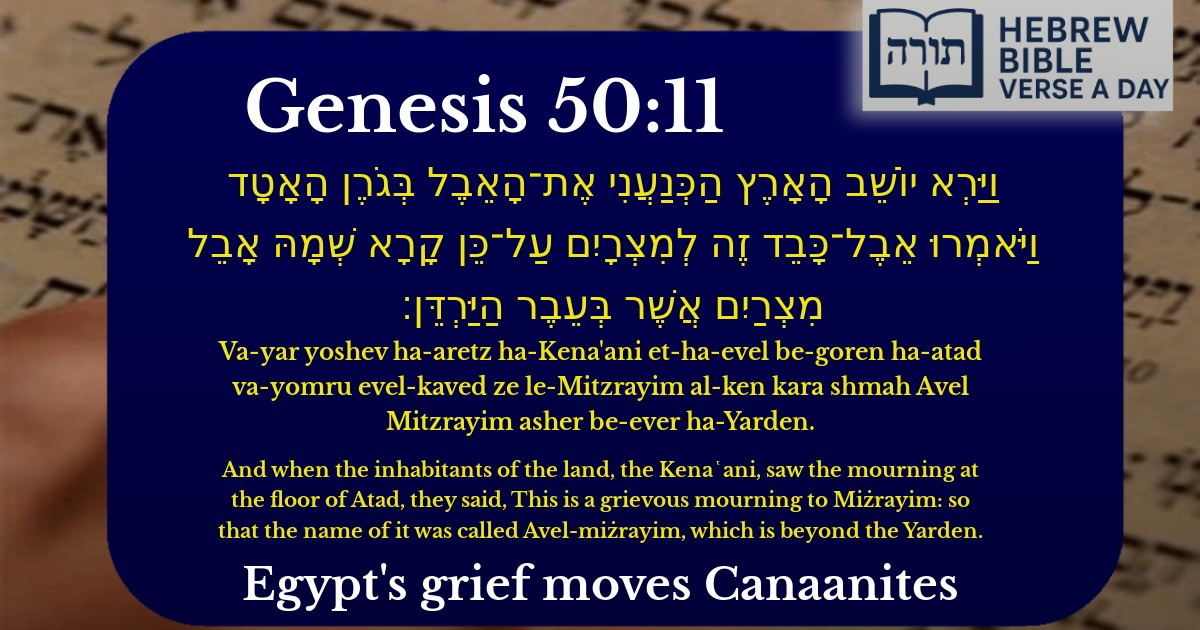Join Our Newsletter To Be Informed When New Videos Are Posted
Join the thousands of fellow Studends who rely on our videos to learn how to read the bible in Hebrew for free!
Hebrew Text
וַיַּרְא יוֹשֵׁב הָאָרֶץ הַכְּנַעֲנִי אֶת־הָאֵבֶל בְּגֹרֶן הָאָטָד וַיֹּאמְרוּ אֵבֶל־כָּבֵד זֶה לְמִצְרָיִם עַל־כֵּן קָרָא שְׁמָהּ אָבֵל מִצְרַיִם אֲשֶׁר בְּעֵבֶר הַיַּרְדֵּן׃
English Translation
And when the inhabitants of the land, the Kena῾ani, saw the mourning at the floor of Atad, they said, This is a grievous mourning to Miżrayim: so that the name of it was called Avel-miżrayim, which is beyond the Yarden.
Transliteration
Va-yar yoshev ha-aretz ha-Kena'ani et-ha-evel be-goren ha-atad va-yomru evel-kaved ze le-Mitzrayim al-ken kara shmah Avel Mitzrayim asher be-ever ha-Yarden.
Hebrew Leining Text
וַיַּ֡רְא יוֹשֵׁב֩ הָאָ֨רֶץ הַֽכְּנַעֲנִ֜י אֶת־הָאֵ֗בֶל בְּגֹ֙רֶן֙ הָֽאָטָ֔ד וַיֹּ֣אמְר֔וּ אֵֽבֶל־כָּבֵ֥ד זֶ֖ה לְמִצְרָ֑יִם עַל־כֵּ֞ן קָרָ֤א שְׁמָהּ֙ אָבֵ֣ל מִצְרַ֔יִם אֲשֶׁ֖ר בְּעֵ֥בֶר הַיַּרְדֵּֽן׃
וַיַּ֡רְא יוֹשֵׁב֩ הָאָ֨רֶץ הַֽכְּנַעֲנִ֜י אֶת־הָאֵ֗בֶל בְּגֹ֙רֶן֙ הָֽאָטָ֔ד וַיֹּ֣אמְר֔וּ אֵֽבֶל־כָּבֵ֥ד זֶ֖ה לְמִצְרָ֑יִם עַל־כֵּ֞ן קָרָ֤א שְׁמָהּ֙ אָבֵ֣ל מִצְרַ֔יִם אֲשֶׁ֖ר בְּעֵ֥בֶר הַיַּרְדֵּֽן׃
🎵 Listen to leining
Parasha Commentary
📚 Talmud Citations
This verse is not quoted in the Talmud.


Context of the Verse
This verse (Bereshit 50:11) describes the mourning procession for Yaakov Avinu as his family transports his body from Egypt to be buried in the Cave of Machpelah in Eretz Yisrael. The procession stops at Goren HaAtad ("the threshing floor of Atad"), where they engage in profound mourning, drawing the attention of the local Canaanite inhabitants.
The Significance of the Mourning
Rashi explains that the term "Eivel Kaved" (a grievous mourning) refers to the great honor accorded to Yaakov through this mourning ceremony. The Sages (Sotah 13a) teach that the kings of Canaan and the princes of Yishmael came to pay their respects, demonstrating Yaakov's elevated status even among neighboring nations. The mourning was so intense that it resembled the mourning for a king of Egypt—hence the name "Avel Mitzrayim" (the mourning of Egypt).
Location: Goren HaAtad
The Midrash (Bereshit Rabbah 100:3) notes that "Atad" (thornbush) symbolizes the idea that the nations recognized the "thorns" (difficulties) that Yaakov endured in his life, particularly during his time with Lavan and the loss of Yosef. The Kena'ani, witnessing this mourning, acknowledged Yaakov's righteousness and the divine protection he merited despite his hardships.
The Canaanite Reaction
Ramban suggests that the Canaanites' observation and commentary highlight the fulfillment of the divine promise that Yaakov's descendants would become a great nation. Even in death, Yaakov's influence was recognized beyond Bnei Yisrael. The naming of the place as "Avel Mitzrayim" serves as a lasting testimony to the respect Egypt and other nations had for Yaakov.
Geographical Note: "Beyond the Jordan"
The verse specifies that this event occurred "beyond the Jordan," which, according to Rashi, refers to the western side of the Jordan River (from the perspective of someone coming from Egypt). This detail emphasizes that the mourning took place just before entering Eretz Yisrael, marking the transition from exile to the promised land—a theme central to Yaakov's life and legacy.